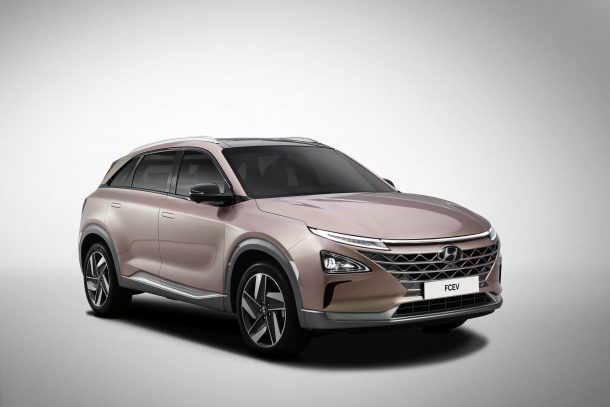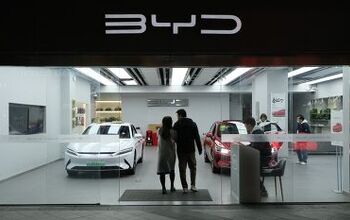Hyundai Plans New Fuel Cell Vehicle for CES, But What's This About Powering Your Home?

Despite the inherent challenges with using hydrogen as a fuel source, Hyundai is plowing ahead with a new generation of fuel cell vehicle as a follow up to the Tucson Fuel Cell it currently offers in limited markets.
Difference is, the current hydrogen-powered Tucson shares a lot of sheetmetal with the traditionally fuelled Tucson. The new, as yet unnamed, hydrogen crossover doesn’t look like anything in Hyundai’s portfolio … at least not yet.
It’s not unrealistic to suspect the machine shown here may be a harbinger of future Hyundai design philosophy, given the company has said it is “near-production” ready. The Hyundai FE Concept shown last year at Geneva looks remarkably similar.
At Geneva, the company said the electrified FCV will boast a range of nearly 500 miles, more than double the range of the most long-legged electric cars and about a hundred miles ahead of Honda’s Clarity Fuel Cell car. However, that 500 mile estimate is likely based on the notoriously optimistic European test cycle, so expect a real-world figure well south of that number. The alarmingly styled Toyota Mirai has an advertised range of 312 miles, for example.
It’s the latest salvo in Hyundai’s burgeoning effort to build eco-minded cars, such as the Ioniq line introduced to take on stalwarts like the Toyota Prius. The company also mentions “hydrogen-powered applications in the home,” alluding to some sort of technology that takes energy generated by the car and uses it to power one’s kitchen coffee pot. Nissan showed off this type of equipment while unveiling the new Leaf, except its solution used batteries and not hydrogen, of course.
Not to be outdone by other manufacturers that are taking full advantage of the mobility buzzword, the new fuel cell crossover will get a raft of driver assistance tech, all of which Hyundai will fully disclose at CES next week. Dubbed the “Advanced Driver Assistance System,” it could be a preview of tech that’ll eventually filter down to workaday Hyundais as a rival to the Honda Sensing suite of safety tech.
Hyundai’s existing entrant in the hydrogen sandbox, the Tucson Fuel Cell, is offered on a 36-month lease at $499 per month with about $3,000 due at signing. Naturally, it’s only available in the few California locales where the hydrogen infrastructure exists to support the running of these machines. Expect this new car, whatever it’s going to be called, to mirror that level of availability.
The press conference for Hyundai’s new Fuel Cell Vehicle will take place at 3:00 p.m. PST on Monday, January 8. You can find the livestream here.
[Images: Hyundai]

Matthew buys, sells, fixes, & races cars. As a human index of auto & auction knowledge, he is fond of making money and offering loud opinions.
More by Matthew Guy
Latest Car Reviews
Read moreLatest Product Reviews
Read moreRecent Comments
- MaintenanceCosts Whenever the topic of the xB comes up…Me: "The style is fun. The combination of the box shape and the aggressive detailing is very JDM."Wife: "Those are ghetto."Me: "They're smaller than a Corolla outside and have the space of a RAV4 inside."Wife: "Those are ghetto."Me: "They're kind of fun to drive with a stick."Wife: "Those are ghetto."It's one of a few cars (including its fellow box, the Ford Flex) on which we will just never see eye to eye.
- Oberkanone The alternative is a more expensive SUV. Yes, it will be missed.
- Ajla I did like this one.
- Zerofoo No, I won't miss this Chevrolet Malibu. It's a completely forgettable car. Who in their right mind would choose this over a V8 powered charger at the rental counter? Even the V6 charger is a far better drive.
- Offbeat Oddity Nope, I won't miss it. I loved the 2008-2012 Malibu, but the subsequent generations couldn't hold a candle to it. I think the Impala was much more compelling at the end.





































Comments
Join the conversation
"The company also mentions “hydrogen-powered applications in the home,” alluding to some sort of technology that takes energy generated by the car and uses it to power one’s kitchen coffee pot. Nissan showed off this type of equipment while unveiling the new Leaf, except its solution used batteries and not hydrogen, of course." Ooooo, an electric car can be equipped to divert its electric power away from the wheel motor and over to...anything else that uses electricity! Seriously, Prius drivers figured this out years ago. It's a great generator for during a power outage. It runs on demand to fill up its battery then shuts off while the battery slowly depletes, then runs itself again to fill the battery back up. And even better, you drive it to the gas station, fill it with 12 gallons of gas, then drive it home. No more lugging gas around and transferring it from the can to the generator.
"more than double the range of the most long-legged electric cars" "about a hundred miles ahead of Honda’s Clarity Fuel Cell car." So which is it? A fuel cell car is an electric. The only significant difference from a battery electric is the source of the electricity.